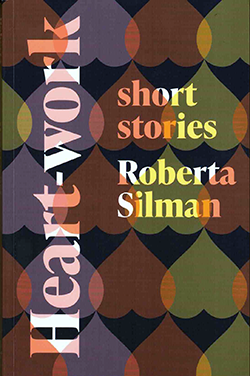Heart-work: short stories by Roberta Silman; Great Barrington, Massachusetts: Campden Hill Books (c) 2024; ISBN 9798985-926026; 261 pages; $15.

 SAN DIEGO — This collection of short stories by Roberta Silman is similar to a travelogue, but instead of journeys through locales, these trips are through human emotions in given situations, especially, but not exclusively, through loss and dying.
SAN DIEGO — This collection of short stories by Roberta Silman is similar to a travelogue, but instead of journeys through locales, these trips are through human emotions in given situations, especially, but not exclusively, through loss and dying.
The short story for which this collection was named, “Heart-work,” deals with an 80-year-old man’s treatment for brain cancer and the impact his fading life expectancy has on his wife, children, and grandchildren. He encourages his 70-year-old wife to learn to swim at a nearby Y and brightens as she reports her progress. Why is it so important to him? Something of him will live on after he has passed.
A similar story tells of a poet, Kate, who nursemaids her dying mentor, an English professor, who has emphysema and lung cancer. But as Kate observes his deterioration, she also analyzes those who come into his diminishing orbit. His academic colleagues come for a visit. “As each one arrived Henry introduced Kate as clearly as he could … from their manner she knew they thought she was a family retainer, for they treated her with polite but disinterested courtesy that most intellectuals reserve for menials.”
Another story about loss, though not through dying, is “Without Wendy,” which follows a man’s life in the aftermath of his wife leaving him for another man. One day, he takes a train to Manhattan and exits Grand Central Station. “It feels so good to walk down a street where no one has the remotest idea who he is or what has been happening to him.”
“The Sugar Road” is an upbeat story about a couple who take an 8-year-old boy, George, who is a mute, on a first cross-country skiing trip. Because he doesn’t speak, they are not sure he understands their instructions, so they monitor his body language and his facial expressions to get a clue. “They all stop and Phil takes out some chocolate and offers it to George. He shakes his head, he is too busy eating snow and now regards them for a moment, then offers Laura and Phil some snow that has frozen so quickly they have to peel it off his mitten. It sounds like Velcro and suddenly George giggles again. At the sound of his happiness Laura feels a deep peace spread through her.”
In almost every one of the 16 short stories in this collection, I felt that I was there in the room or on the slopes with the main characters. “So that’s what it would be like to live through this situation,” I found myself thinking again and again.
*
Donald H. Harrison is publisher and editor of San Diego Jewish World.
Sounds interesting.